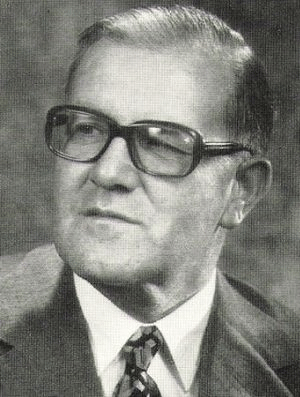by Wikipedia
Accessed: 6/9/18
NOTICE: THIS WORK MAY BE PROTECTED BY COPYRIGHT
YOU ARE REQUIRED TO READ THE COPYRIGHT NOTICE AT THIS LINK BEFORE YOU READ THE FOLLOWING WORK, THAT IS AVAILABLE SOLELY FOR PRIVATE STUDY, SCHOLARSHIP OR RESEARCH PURSUANT TO 17 U.S.C. SECTION 107 AND 108. IN THE EVENT THAT THE LIBRARY DETERMINES THAT UNLAWFUL COPYING OF THIS WORK HAS OCCURRED, THE LIBRARY HAS THE RIGHT TO BLOCK THE I.P. ADDRESS AT WHICH THE UNLAWFUL COPYING APPEARED TO HAVE OCCURRED. THANK YOU FOR RESPECTING THE RIGHTS OF COPYRIGHT OWNERS.

Armin Mohler (12 April 1920 – 4 July 2003) was a Swiss-born far right political writer and philosopher associated with the Neue Rechte movement.
Life
Born in Basel, Mohler studied at the University of Basel, where he briefly supported communism.
At 20, he was called up to the Swiss army, but his reading the works of Oswald Spengler as well as the June 1941 German invasion of the Soviet Union made him defect to Nazi Germany, which he supported, in 1942. He aimed to join the Waffen SS, but Mohler was not trusted by the SS authorities, who refused to accept him.
Still, he remained in Berlin for another year before returning to Switzerland, where he was incarcerated for desertion.
After World War II, he returned to study in Berlin and completed his doctoral thesis Die Konservative Revolution in Deutschland 1918-1932 (The Conservative Revolution in Germany, 1918-1932), under Karl Jaspers in 1949. The aim of his thesis was not only scientific but also providing old traditions for new pathways for a non-national socialist right in post-war Germany. In the same year, he worked as a secretary for his idol Ernst Jünger but increasingly felt that Jünger had become too moderate for his taste after the end of the war.
Mohler went on to work as a correspondent in Paris for Die Zeit, from 1953 to 1961. After that he lived in Munich, leading the Carl Friedrich von Siemens Foundation. For a brief period he worked as a speech writer for Franz Josef Strauß,[1] but his influence was marginal. In 1967, he became the first to receive the Konrad Adenauer Prize, which provoked strong media attacks on him.
In 1970, he became a major contributing editor to Caspar von Schrenck-Notzing's conservative monthly magazine Criticon, Germany's most important platform for non-mainstream conservative thought for almost three decades. He died in Munich, at the age of 83.
Writings and ideas
Mohler's seminal work is his book Die Konservative Revolution in Deutschland 1918-1932 ("The Conservative Revolution in Germany, 1918-1932"), which initially his doctoral thesis. There, he tried to unearth Weimar Republic right-wing thought and tradition apart from and alternative to National Socialism. The most crucial thinkers of the "Conservative Revolution" to him were Ernst Jünger, Oswald Spengler, Carl Schmitt, Ernst Niekisch, Hans Blüher and Thomas Mann (before his turn to liberalism).
Mohler was one of the first German publishers to write about the ideas of his long-time friend Alain de Benoist, who founded the Nouvelle Droite. Similar as Benoist, Mohler advocated a Right that would oppose both socialism and liberalism, with a decided emphasis on the latter.
According to Michael Minkenberg, Mohler's ideas owed more to the Nouvelle Droite associated with GRECE than the Ostpolitik-derived ideas of a strong German state that was associated with contemporaries like Robert Spaemann and Gerd-Klaus Kaltenbrunner.[2]
One of his favourite targets was the so-called "Vergangenheitsbewältigung", which he criticized in several books. That argument involved the claim that postwar Germany should 'step out of Hitler's shadow'. It was thus claimed that Mohler was a forerunner of Ernst Nolte and associated thinkers, who were involved in the Historikerstreit.[3]
In the 1950s, Mohler contributed to journals such as Nation Europa and Die Tat (not to be confused with an older paper of the same title). He also wrote for mainstream newspapers such as Die Zeit and (in the 1960s and 1970s) Die Welt. In his later years, he supported the "Neue Rechte" weekly paper Junge Freiheit.
Under the alias 'Michael Hintermwald,' he also contributed two articles to Gerhard Frey's Deutschen National-Zeitung for which he was much criticized.
Political activism
Mohler was initially a supporter of Franz Josef Strauß and the Christian Social Union of Bavaria but later worked with Franz Schönhuber in the founding of The Republicans.
Fascism
Mohler's notion of Conservative Revolution has been described by some, like Roger Griffin, as fascism.[4] In a newspaper interview, Mohler accepted that he was a fascist but only in the tradition of José Antonio Primo de Rivera and with the acceptance of the notion that fascism had its roots in the far left, as argued by Zeev Sternhell.
References:
1. "Ghostwriter von Franz Josef Strauß - Business And Science" (in German). Retrieved 2016-09-21.
2. M. Minkenberg, 'The New Right in France and Germany: Nouvelle Droite, Neue Rechte, and the New Right Radical Parties', P. H. Merkl & L Weinberg (eds.), The Revival of Right Wing Extremism in the Nineties, London: Frank Cass, 1997, pp. 73-4
3. Prelude, Interlude, Afterlude. Spotlights on German Debates
4.^ R. Griffin, The Nature of Fascism, London : Routledge, 1993, pp. 166-9
External links
• (in German) Literature by and about Armin Mohler
